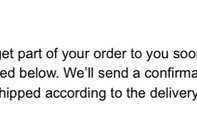
Margaret Atwood’s Handmaid’s Tale sequel The Testaments has generated movie-tentpole levels of advance hype before its official release date on September 10, including the fact that it landed on the Man Booker short list, and that Hulu has already bought the rights to it. Now, it’s actually been delivered to people before that official release date. As The Guardian reports, Amazon shipped around 800 orders of the new novel on Tuesday in the United States, which, according to a statement from the book’s publisher Penguin Random House, was “due to a retailer error which has now been rectified.” “We appreciate that readers have been waiting patiently, in some cases for more than 30 years, for the much anticipated sequel,” Penguin Random House said to The Guardian. “In order to ensure our readers around the world receive their copies on the same day, our global publication date remains Tuesday 10 September.”
The surprise early shipping has generated plenty of excitement from fans who’ve gotten their hands on the novel a week early. “It’s here! Can I use an excessive amount of exclamation points? It’s here!!!!!!!!!!!!” tweeted Daniel Valentin, a high-school English teacher in Chappaqua. Some Amazon customers were informed they’d be getting the book early: “Good news!” a note sent to Valentin read. “We’re able to get part of your order to you sooner than we originally promised.” Valentin assumed the embargo had been lifted. “Evidently,” he wrote in a note to Vulture, “that is not the case.”
Lexi Beach, the co-owner of the Astoria Bookshop, says it’s not that unusual for books to be shipped before their intended embargo, a point brought up on a Twitter thread discussing the early shipment of The Testaments by an Amazon customer named Erin Jones. “I preordered Atticus’s The Truth About Magic months ago,” Jones told me. This week, the book showed up a week before it was scheduled for publication, along with some dog bones she’d ordered. “It just showed up in the mail,” she wrote in a message. “Was completely surprised.”
Whether the early shipments were planned, as some contended, or not, the broken embargo did, in a sense, serve the customer — which Amazon is better equipped to do than fellow booksellers without facing repercussions in the industry. Indeed, the audience most frustrated by all this are independent booksellers. “The thing about these embargo agreements is that they’re basically unenforceable, at least as far as Amazon is concerned,” Matt Keliher, the manager of Subtext Bookstore in Saint Paul, Minnesota, explained to Vulture. “But I was just looking at the one I signed, and they list very clearly the punishments for breaking it. If an independent bookstore made an error like that, there are real punishments that Random House can inflict on us that they really can’t on Amazon.” If Keliher broke the agreement, he continued, they could stop sending him books, forcing him, essentially, to close. “It’s a real threat to a store like mine, but it’s not a threat to a store like Amazon, and that’s why independents abide by these rules and Amazon doesn’t.” For independent booksellers, the harm mostly comes down to the perception that if readers want to get a book before its scheduled to be published, Amazon may be a better bet than placing a preorder with their local bookstore. “An event like this changes the mind of the consumer in a way that’s not really measurable,” Keliher continued. “It’s what Amazon has been good at doing across all markets for a long time and it’s why they are as powerful as they are.”
As to why or how this really happened, both Amazon and Penguin Random House are unwilling to offer any insight. Amazon has given no public statement, and declined to give an interview to Vulture or any other publications; Penguin Random House declined to speak beyond their general statement to the press. While they did, vaguely, suggest they would be addressing the problem, they did not offer any information as to how they would go about reprimanding the most powerful retailer in the world.
Update, September 5, 12:30 p.m.: Late Wednesday, the American Booksellers Association announced that it has already been in contact with officials at the U.S. Department of Justice and the Federal Trade Commission about the damage Amazon is inflicting on the publishing industry. “Amazon’s latest actions only further underscore how important it is that the appropriate federal agencies thoroughly investigate Amazon’s destructive business practices,” the ABA wrote in a statement. On Thursday morning, Amazon finally broke its silence. “Due to a technical error a small number of customers were inadvertently sent copies of Margaret Atwood’s The Testaments,” a spokesperson for the company wrote in an email. “We apologize for this error; we value our relationship with authors, agents, and publishers, and regret the difficulties this has caused them and our fellow booksellers.”


